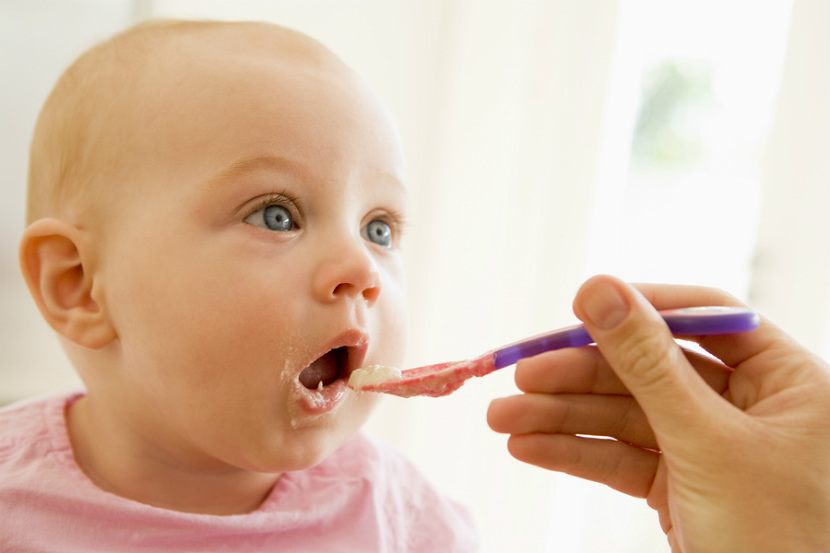
Do you have questions about how to safely feed your baby when introducing solids? Read on to get tips on how to avoid gagging, choking and food-related illness.
When can I introduce solid foods to my baby?
You can introduce solids at around six months. Your baby is ready to start solids when he:
-
Has good head control
-
Can sit up and lean forward
-
Can pick up food and try to put it in her mouth
-
Can turn her head away to let you know she is full
How do I help prevent gagging when feeding my baby solid foods?
Gagging may happen when your baby is learning to eat solids. Gagging is when food comes too close to the back of your baby’s throat without him swallowing. It is normal and can help prevent choking on a food. Use these tips to help prevent gagging:
-
Have your baby sit up straight (not slouched) and buckle him securely in a high chair
-
Feed your baby slower
-
Use a smaller spoon and put less food on the spoon
-
Offer foods at the table with no distractions
-
Offer textures your baby can easily eat. If your baby is gagging on foods mashed with big lumps try smaller lumps.
How do I help prevent choking when feeding my baby solid foods?
Choking is when food gets stuck in the throat. It’s very serious, so it’s important to always stay with your baby during mealtimes. To prevent choking, do not give your baby:
-
Raw vegetables and hard fruits like apples unless they are grated
-
Small, smooth objects like peanuts and nuts, hard candy, cough drops, ice cubes, gum or marshmallows
-
Dried fruit or seeds: Like raisins, pumpkin seeds, or sunflower seeds
-
Grapes and hot dogs unless cut up into bite size pieces or cut lengthwise
-
Fish with bones
-
Popcorn
-
Stringy foods like celery and pineapple unless they are finely chopped
-
Peanut butter or other nut butters spread thickly or served on a spoon. Spread a thin layer on a cracker or piece of toast (not soft bread).
If your baby gags often, seems to have trouble swallowing, or chokes on food, talk to your health care provider.
What types of solid foods should I avoid to prevent by baby from getting sick?
Babies should not be given unpasteurized or pasteurized honey until after 12 months of age. Babies should also not have foods made with honey like yogurt or cereal. This is because honey can cause botulism poisoning. All milk, juice and cheese should be pasteurized.
What about fish and mercury?
Some types of fish are high in mercury and should be limited for babies under one year of age. Limit the following fish to 40 grams (1.4 oz):
-
Canned white (albacore) tuna per week
-
Frozen or fresh tuna, shark, swordfish, marlin, orange roughy and escolar per month
Find out more about recommended types of fish for older children over one year of age.
Bottom Line
Keeping your baby safe is important when introducing solids and beyond. If you have questions about introducing solids, speak to your health care provider.
You may also be interested in:
Introducing Solids to Your Baby
Food Safety and Children
Food Allergies and Babies
Last Update – July 25, 2018